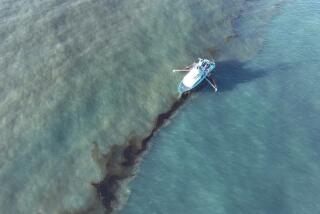Gulf oil complex is spared the brunt
- Share via
Energy analysts and traders were cautiously optimistic Monday that the vital Gulf Coast oil complex had dodged a potentially devastating blow.
A weakened Hurricane Gustav came ashore about 70 miles southwest of New Orleans, passing over the key Louisiana Offshore Oil Port but missing areas most heavily populated with oil and natural-gas drilling rigs and production platforms, experts said.
Risk Management Solutions, which provides damage assessments for insurance companies and others, on Monday said it expected Hurricane Gustav to cause from $1 billion to $3 billion in losses among offshore oil platforms and wells. On Sunday, the firm had estimated $2 billion to $7 billion in damage.
“Gustav weakened from a Category 4 hurricane to a Category 3 storm before blustering into the platforms,” RMS’ Christine Ziehmann said. “The platforms tend to be fairly resilient to Category 3 level winds, so the structural damage and impact on production will be relatively low.”
Little will be known for certain until energy companies can deploy workers to refineries and production platforms, but oil investors appeared to see Gustav’s threat to energy supplies as greatly diminished Monday. Crude for October delivery fell $4.34 to $111.12 a barrel in late afternoon electronic trading on the New York Mercantile Exchange.
That bodes well for consumers, who have been enjoying several weeks of gas price declines. The U.S. average cost of self-serve regular gasoline was $3.686 a gallon Monday, down 20 cents from a month earlier.
The Gulf region accounts for a quarter of U.S. oil production and about 15% of its natural-gas output. In preparation for Gustav, workers were evacuated and all of the Gulf’s offshore oil production -- about 1.3 million barrels of oil a day -- and more than 95% of its natural-gas output was halted.
Barring significant equipment damage or worker shortages, much of that production could be back on line in two weeks or so. If Gustav’s destruction turns out to be more severe, then the federal government could release oil from the Strategic Petroleum Reserve, which it did after Katrina.
It’s unclear how much damage Gustav did to the Louisiana Offshore Oil Port -- a major crude import facility connected by pipeline to refineries along the Mississippi River.
Oil output and its delivery to Gulf refineries could be less of an issue, though, because gasoline demand has been sluggish in response to high prices and traditionally slumps after Labor Day.
Much remains unknown about the fate of refineries that stretch from Alabama through Louisiana and into Texas, which collectively account for about half of the nation’s oil-processing capacity. As of Monday morning, the storm had shut 12 refineries and slowed production at 10 more, representing a loss of more than 10% of U.S. gasoline production.
“This hurricane event is not over yet . . . and you had a wide swath of area that lost power,” said Andrew Lipow, a Houston-based consultant. Long power outages could cripple big refineries as well as the pipeline pumps that send fuel to the Northeast and other regions -- a big problem after Katrina.
Lipow noted that the winds were not as severe as during Katrina and the storm moved quickly over land, giving hope that refineries wouldn’t suffer as much flooding damage as they did three years ago.
“I’m expecting much less damage,” Lipow said. Compared with Katrina, he added, “The industry as a whole is more prepared to get back running again.”
Stephen Schork, who writes a newsletter on oil and energy markets, said Gustav was not strong enough to derail a general slide in oil and gasoline prices.
“Barring any long-standing damage from Gustav, we are heading lower,” Schork said.
--
elizabeth.douglass@latimes.com
More to Read
Sign up for Essential California
The most important California stories and recommendations in your inbox every morning.
You may occasionally receive promotional content from the Los Angeles Times.













